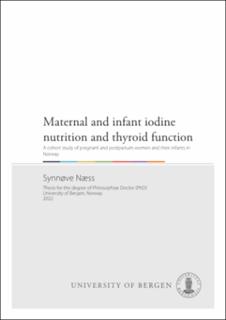| dc.contributor.author | Næss, Synnøve | |
| dc.date.accessioned | 2022-06-10T07:46:00Z | |
| dc.date.available | 2022-06-10T07:46:00Z | |
| dc.date.issued | 2022-06-24 | |
| dc.date.submitted | 2022-06-03T13:31:57.654Z | |
| dc.identifier | container/1e/e0/b5/ab/1ee0b5ab-f05a-4197-be36-e968e6ff32f9 | |
| dc.identifier.isbn | 9788230855966 | |
| dc.identifier.isbn | 9788230861332 | |
| dc.identifier.uri | https://hdl.handle.net/11250/2998246 | |
| dc.description.abstract | Background: Iodine is a micronutrient essential for the production of the thyroid hormones. The thyroid hormones are particularly important for neurodevelopment of the foetus during pregnancy and for the developing child in the first years of life. Whereas the adverse effects of severe iodine deficiency are well documented, the consequences of mild-to-moderate iodine deficiency during pregnancy and infancy are still uncertain and data are limited.
Objectives: The main objective of this thesis was to describe iodine nutrition and thyroid function and to explore associations between them in a cohort study of pregnant and postpartum women and their infants. The specific objectives were to:
I) Assess the validity and reproducibility of an iodine-specific food frequency questionnaire (I-FFQ) developed for pregnant women.
II) Explore whether iodine nutrition and timing of iodine supplement initiation were associated with altered thyroid function in mildly-to-moderately iodine-deficient pregnant and postpartum women.
III) Describe infant iodine status and thyroid function and further explore associations between them in the first year of life. In addition, assess the impact of maternal iodine nutrition and breastfeeding status on infant iodine status.
Methods: A total of 137 pregnant women were enrolled and followed-up at gestational weeks (GW) 18 and 36, and further with their infants at 3, 6 and 11 months postpartum. Dietary iodine intake from an I-FFQ and a six-day food diary, urinary iodine and creatinine concentrations (UIC and UIC:Cr), breast milk iodine concentration (BMIC) and thyroid function tests (thyroid-stimulating hormone (TSH), free triiodothyronine (fT3) and free thyroxine (fT4)) were measured.
Results: Maternal iodine intake estimated from the I-FFQ showed acceptable correlation and agreement with iodine intake estimated from the six-day food diary and UIC, indicating that the I-FFQ can be used as a tool to estimate and rank iodine intake in this population.
The median maternal UIC was below 100 µg/L during pregnancy (GW18: 94 µg/L; GW 36: 85 µg/L) and in the postpartum period (3 months: 74 µg/L; 6 months: 84 µg/L), indicating mild-to-moderate iodine deficiency of the mothers. The median infant UIC was 82 µg/L at age 3 months, thus, below the recommended WHO cut-off (100 µg/L), also indicating insufficient iodine status. Median infant UIC increased during the first year of life and was 110 µg/L at ages 6 and 11 months, indicating adequate iodine status at these ages.
Infant UIC was associated with maternal iodine intake, UIC:Cr and BMIC. At ages 3 and 6 months, breastfed infants had a lower median UIC (76 and 105 µg/L, respectively) compared with formula-fed infants (190 and 315 µg/L, respectively). At age 11 months, no differences between breastfeeding categories were found.
The prevalence of maternal and infant thyroid dysfunction in this study population was low. Lower maternal iodine availability (measured by iodine intake and UIC:Cr) was associated with higher fT3 and fT4 concentrations, and lower TSH concentrations (intake only). Compared with no use of supplements, those initiating an iodine-containing supplement before conception and continuing through pregnancy had lower TSH, and higher fT3 and fT4 concentrations. No associations were found between infant UIC nor BMIC with infant thyroid function (TSH, fT3, fT4).
Conclusion: Pregnant and postpartum women and breastfed infants in their first months of life are at risk of iodine deficiency in Norway. No associations were found between infant iodine status and thyroid function. Maternal iodine nutrition was, however, associated with altered thyroid function tests, and initiation of iodine supplementation before conception and continuing through pregnancy was associated with possible improved thyroid function. Overall, to ensure normal thyroid function in the developing foetus and growing infant, maternal iodine nutrition should be optimised before conception and continued throughout pregnancy and the postpartum period. Awareness of promoting adequate iodine nutrition for these vulnerable population groups should be prioritised to secure sufficient iodine intake for mothers and, subsequently, their infants. | en_US |
| dc.language.iso | eng | en_US |
| dc.publisher | The University of Bergen | en_US |
| dc.relation.haspart | Paper I: Næss S, Aakre I, Kjellevold M, Dahl L, Nerhus I, Midtbø LK, Markhus MW. Validation and reproducibility of a new iodine specific food frequency questionnaire for assessing iodine intake in Norwegian pregnant women. Nutrition Journal. 2019;18(1):62. The article is available in the thesis file. The article is also available at: <a href="http://dx.doi.org/10.1186/s12937-019-0489-4" target="blank">http://dx.doi.org/10.1186/s12937-019-0489-4</a> | en_US |
| dc.relation.haspart | Paper II: Næss S, Markhus MW, Strand TA, Kjellevold M, Dahl L, Stokland AEM, Nedrebø BG, Aakre I. Iodine Nutrition and Iodine Supplement Initiation in Association with Thyroid Function in Mildly-to-Moderately Iodine-Deficient Pregnant and Postpartum Women. The Journal of Nutrition. 2021;151(10):3187-96. The article is available at: <a href="https://hdl.handle.net/11250/2941765" target="blank">https://hdl.handle.net/11250/2941765</a> | en_US |
| dc.relation.haspart | Paper III: Næss S, Aakre I, Strand TA, Dahl L, Kjellevold M, Stokland AEM, Nedrebø BG, Markhus MW. Infant iodine status and associations with maternal iodine nutrition, breastfeeding status and thyroid function. British Journal of Nutrition. 2023;129(5):854-863. The article is available at: <a href="https://hdl.handle.net/11250/3022187" target="blank">https://hdl.handle.net/11250/3022187</a> | en_US |
| dc.rights | In copyright | |
| dc.rights.uri | http://rightsstatements.org/page/InC/1.0/ | |
| dc.title | Maternal and infant iodine nutrition and thyroid function : A cohort study of pregnant and postpartum women and their infants in Norway | en_US |
| dc.type | Doctoral thesis | en_US |
| dc.date.updated | 2022-06-03T13:31:57.654Z | |
| dc.rights.holder | Copyright the Author. All rights reserved | en_US |
| dc.contributor.orcid | 0000-0002-0677-618X | |
| dc.description.degree | Doktorgradsavhandling | |
| fs.unitcode | 13-26-0 | |
